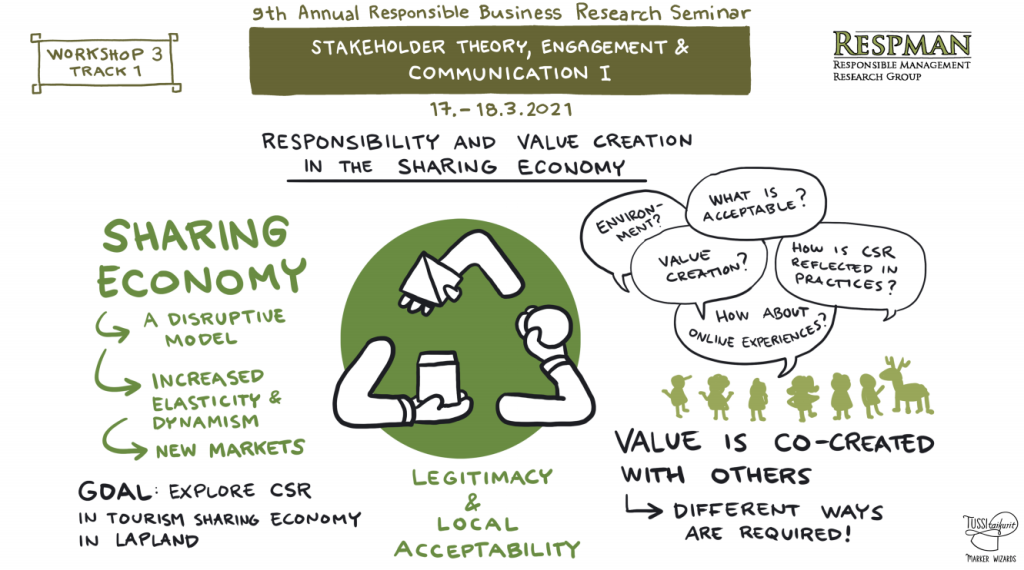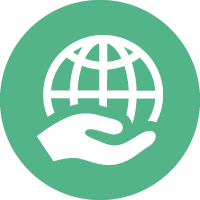All members of our research team in the project took part in the in the 9th Responsible Business Research Seminar on 17 and 18 March 2021. This time the seminar organized by the Faculty of Management and Business of University of Tampere was held compeletely online due to the current situation of the pandemic. In the seminar Junior Researcher Petra Paloniemi presented the project and the current situation of the research activities. The goal was to get new insights and feedback to our research endeavors.
As background the phenomenon and the scale of the sharing economy based business was explained. The sharing economy or collaborative economy is characterized by elasticity and dynamism that continuously form new markets, tourism structures, and tourism experiences and also transforms tourism destinations (Tussyadiah & Sigala 2018). The sharing economy can be considered as a disruptive model (Guttentag, 2015). For example in Lapland, the demand for tourism services exceeded the offer of traditional suppliers, which contributed to creating a suitable business environment and demand for sharing economy services (Paloniemi, Jutila & Hakkarainen 2021). It has become a common practice also for many private persons to offer their homes, goods, and services by relying on the digital platforms. This development has led to questions about the responsibilities and impacts of these new sharing economy organizations.
Then the aim of our study was explained. The goal of our research is to shed light on the phenomenon of sharing economy by addressing the following research questions:
- What kind of sharing economy-based tourism is locally acceptable?
- How is CSR reflected in the practices of sharing economy companies?
- How can the sharing economy help companies develop their value creation process?
- What are the legal responsibilities of platform service providers?
Next, the research methodology was explained. The project follows a participatory action research methodology (see also García-Rosell 2013; Hakkarainen 2017) and the action research is being conducted in Finnish Lapland during 2020-2022 with multi-stakeholder group of participants. In the process of the action research, the organizations and companies who participate in the project bring their questions and interests related to the phenomenon of sharing economy and platform-based economy and those are being discussed and reflected in the action research workshops. There are representatives of around 10 organizations who take part in the action research together with us researchers. The organizations represent for example the following fields: sharing economy-based platform, intermediaries, TUKES (Finnish Safety and Chemicals Agency), City of Rovaniemi (Construction Supervision), Property Manager, tourism company. In our action research study, we collect multiple and diverse data, for example, field notes (of the meetings and workshops), interviews, survey, media, platform guidelines, host-guest correspondence, data of accommodation and experiences (also online) offered in Lapland and other parts of Finland. Data analysis is mostly content analysis and discourse analysis and legal data analysis.
Preliminary findings and reflections of our research include notions that often value is co-created with others through multi-party interactions within dynamic contexts such as service ecosystems. In value creation you need to understand the holistic view of networks and values, the existing problems and how the situations and meanings are constantly changing in turbulent world. Different ways of creating value will be required in the tourism industry as crises continue to present challenges now and later. In the past, tourism has proven itself to be a resilient industry, now its ability to recover is being tested (see also Fennell 2021.) Learning more about the process of value creation and CSR in sharing economy might offer some adaptation and transformation examples during rapidly changing times also to tourism field.
After the presentation we had interesting discussion on the topic and we got precious feedback from the other participants of the research seminar. We had some questions to the seminar participants for example on value creation in sharing economy platforms (including online experiences) and on studying CSR in the sharing economy. We also learnt a lot from other interesting presentations in the seminar and were able network with other participants.
Photo 1. Illustration of our presentation by Tussitaikurit

Sources:
Fennell, D., A. 2021. Technology and the sustainable tourist in the new age of disruption, Journal of Sustainable Tourism, 29:5, 767-773
García-Rosell, J-C. 2013. A multi-stakeholder perspective on sustainable marketing: Promoting sustainability through action and research. Doctoral Dissertation. Rovaniemi: Lapland University Press.
Guttentag, D. A. 2015. Airbnb: Disruptive innovation and the rise of an informal tourism accommodation sector. Current Issues in Tourism, 18(12), 1192–1217.
Hakkarainen, M. 2017. Matkailutyön ehdot syrjäisessä kylässä. Acta Universitas Lapponiensis 357. Rovaniemi: Lapin yliopisto.
Paloniemi, Jutila & Hakkarainen 2021. Sharing Economy in Peripheral Tourism Destinations: The Case of Finnish Lapland. In Della Lucia, M. & Giudici, E. (eds). Humanistic Management and Sustainable Tourism: Human, Social and Environmental Challenges. Routledge.
Tussyadiah, I. P. & Sigala, M. 2018. Shareable tourism: tourism marketing in the sharing economy, Journal of Travel & Tourism Marketing, 35:1, 1-4.

0 kommenttia